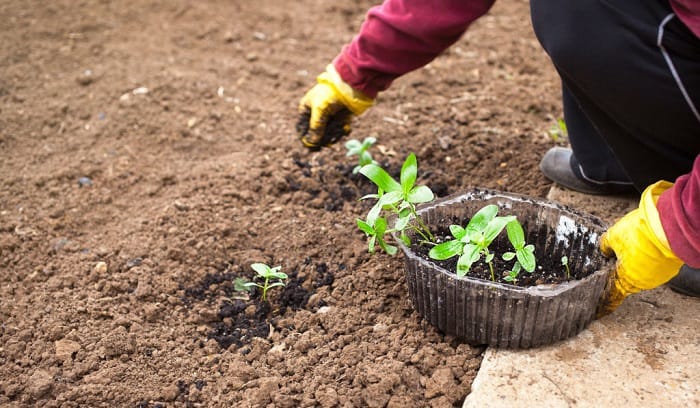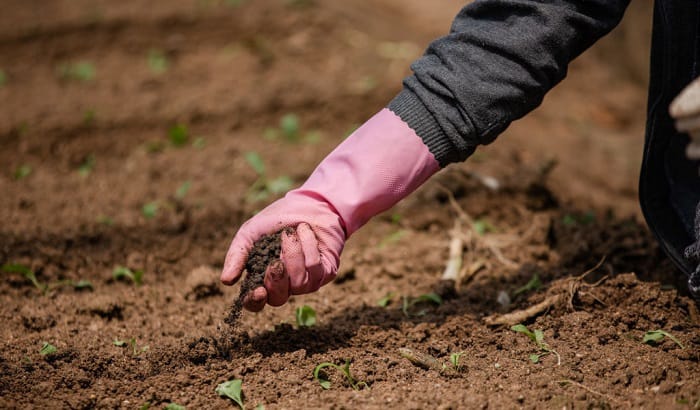Gardening is fun and delightful, especially when observing the process of flowers blooming and fruit ripening. Besides choosing the right seeds, soil conditions, and water sources, spreading fertilizer periodically is crucial to keep the plants healthy and fruitful.
It is generally advisable that people wear safety gloves when working with fertilizers because they can be hazardous. But, why is it wise to wear gloves when spreading fertilizer? If you only spread a small amount in your home garden, is it necessary? The short answer is yes.
Physical contact with the chemicals and living microorganisms in fertilizers can cause skin reactions or more severe symptoms like dizziness, fainting, seizures, and even anaphylaxis.
Table of Contents
What Is Plant Fertilizer
Fertilizer is a natural or chemical substance supplied to crops to optimize their productivity. It helps improve the soil’s water retention rate and fertility. Some kinds of hydrochloric acid fertilizers are used to alter the soil pH level. The main ingredients of fertilizer include nitrogen, phosphorus, and potassium.
On the other hand, natural fertilizers are obtained from livestock manual, agricultural waste, or simply household waste, such as grass clippings, tree leaves, coffee grounds, and eggshells.
Is It Safe to Touch Fertilizer With Your Hands
Though spreading a little organic fertilizer to your small flowerpot seems harmless, the answer to “Can you touch fertilizer with your hands?” is no. Accidental ingestion, physical contact, and inhalation can lead to light reactions or severe fertilizer poisoning symptoms.
Industrial fertilizers contain numerous chemicals: nitrates, phosphoric acid, ammonium sulfate, sulfur, micronutrients, potash, and lime. When present in the human body at high levels, nitrates reduce the ability to carry and deliver oxygen of the red blood cells, causing the following symptoms:
- Shortness of breath, upset stomach, or stomachache
- Pale body parts (e.g., hands, fingertips, lips) due to the lack of oxygen
- Low blood pressure
- Dizziness and fainting
- Seizures
When you wear gloves, take them off, and wash your hands properly after fertilizing, the risk of chemicals transferring to food, skin, pets, or surfaces you touch is eliminated. That being said, organic or household fertilizers are not any safer. There are many bacterias, parasites, fungi, and mold in homemade plant food. If inhaled or swallowed, they are just as vicious.
Other than that, getting lawn fertilizer on the skin can lead to the following body reactions:
- Skin redness
- Itchy skin
- Burning sensations on the skin, eyes, nose, or throat.
Skin rash from fertilizer should never be taken lightly. Rashes indicate an allergic reaction, which can evoke anaphylaxis, a life-threatening condition of throat swelling and difficulty breathing. Gloves will prevent the microorganisms from contacting or entering the body through open scratches.
What Should You Wear When Spreading Fertilizer
Don’t just put on random gloves when spreading fertilizer as the wrong ones might do you more harm than good. If you work with fertilizer regularly, it’s best to invest in high-quality garden gloves that are waterproof and scratch-resistant. Otherwise, you can wear a pair of disposable rubber gloves underneath thick cotton ones.
Here is an excellent video by Lee Burkhill you can refer to for garden glove advice:
In addition to gloves, you’ll need:
- A mask to protect you from inhaling toxic chemicals, natural bacteria, and unpleasant odors.
- Safety goggles to shield the eyes against UV rays and poisonous substances.
- Overall suits to minimize skin exposure to the fertilizer.
Conclusion
Fertilizers can be more hazardous than you think. Remember to always put your safety first while working with chemicals and sharp objects. The appropriate gloves will not only protect your hands but also make gardening easier and more enjoyable.
If you find the article on why is it wise to wear gloves when spreading fertilizer informative, please share it with your friends who are in need. Before you leave, let us know your thoughts in the comments. Thank you for reading!

Veronica is our content editor. She is a talent in delivery. Her main work is editing and writing articles that are both informative and simple to follow. She is in charge of synthesizing our understanding of what personal protection equipment (PPE) is needed in each job, how to best apply it, and how to visualize that equipment.



